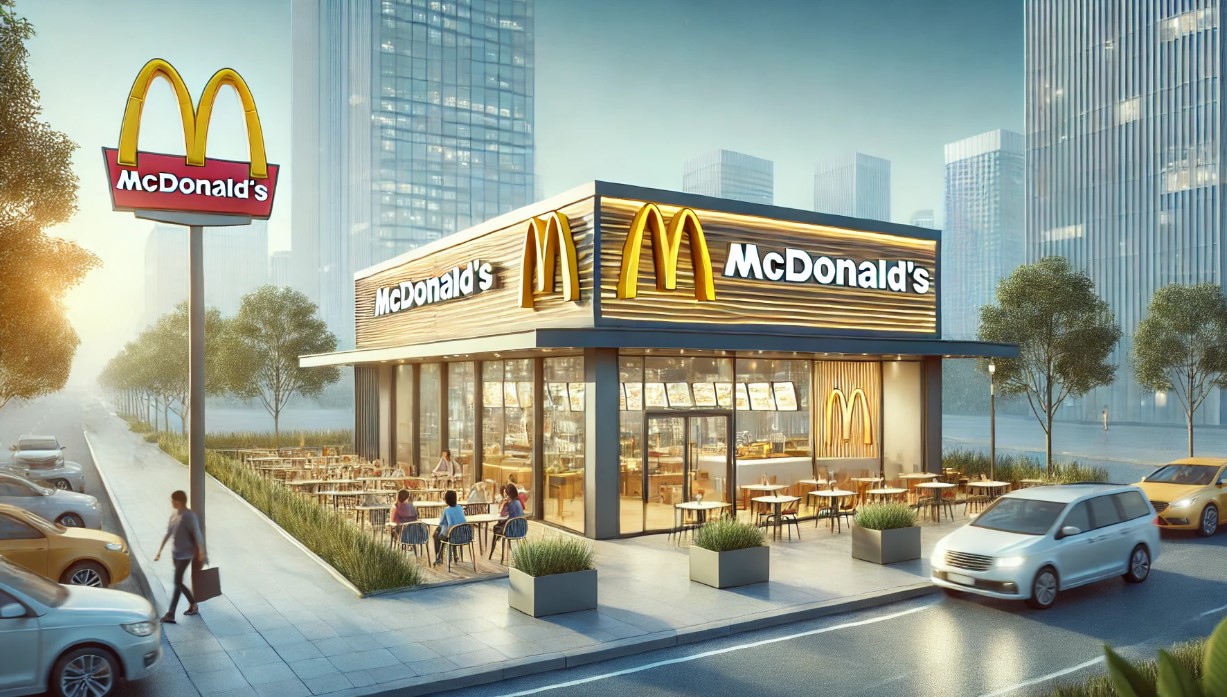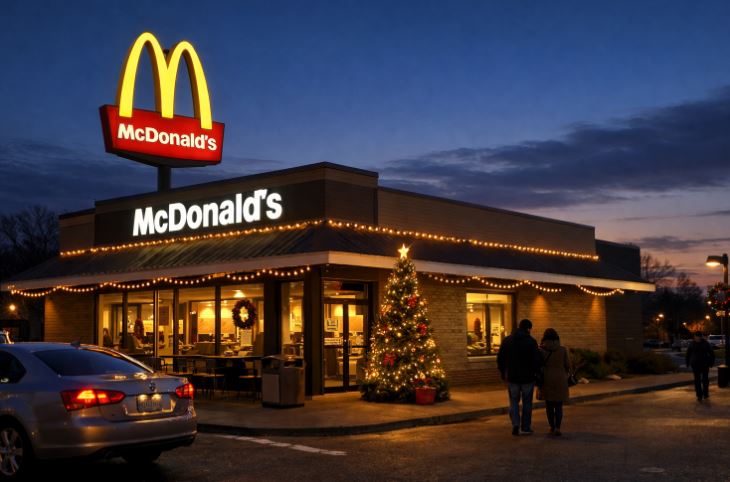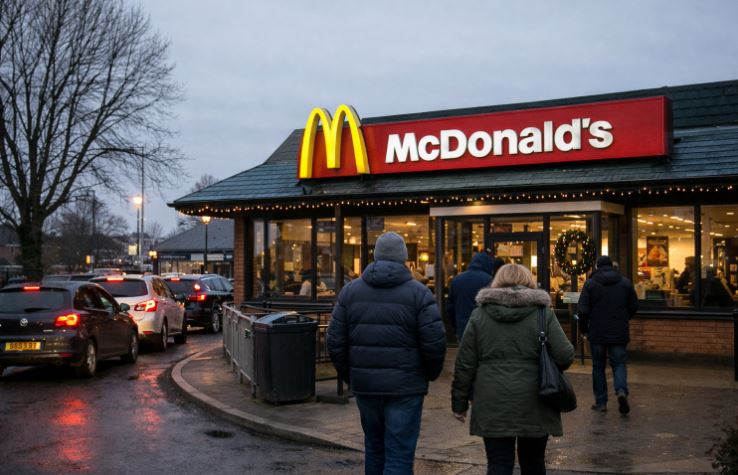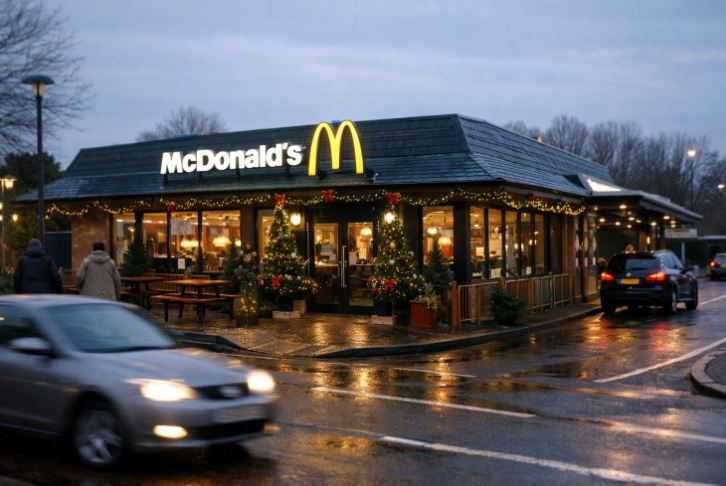Have you ever dreamed of running your own business with the backing of a world-renowned brand? Owning a McDonald’s franchise in the UK offers entrepreneurs an opportunity to tap into a proven business model that has stood the test of time.
As the most recognisable fast-food chain globally, McDonald’s ensures its franchisees have the resources, support, and guidance needed for success.
However, like any major business investment, understanding the financial commitments is crucial. This blog will break down the costs, fees, and benefits of owning a McDonald’s franchise in the UK, along with insights into profitability and potential returns.
Whether you’re a seasoned entrepreneur or exploring franchising for the first time, this guide will help you make an informed decision.
What Does It Cost to Own a McDonald’s Franchise in the UK?
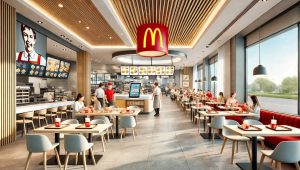
McDonald’s franchises operate on a unique system where ownership comes with a blend of responsibilities and privileges. Aspiring franchisees can either purchase a new restaurant or acquire an existing one from another franchisee.
Annual Sales Performance
From January to December 2023, 80% of McDonald’s UK franchised restaurants reported annual sales between £2.0 million and £5.8 million. These figures reflect the strong earning potential and consistent customer demand that McDonald’s restaurants typically enjoy.
While sales figures are impressive, they are directly tied to factors such as location, management efficiency, and customer service quality.
How Much Is the Initial Investment for a McDonald’s Franchise?
The initial investment is one of the most critical aspects of franchising with McDonald’s. Here’s a breakdown of the key costs involved:
Franchise Fee and Equipment Costs
The total investment for a McDonald’s franchise ranges from £500,000 to £1.85 million. This amount includes:
- The cost of purchasing the franchise rights.
- Equipment and setup for your restaurant, valued based on projected future cash flows over a 10-year period.
Unencumbered Funds Requirement
McDonald’s requires franchisees to pay 25% of the total investment upfront using unencumbered funds. For example, if the investment is £500,000, you must have at least £125,000 available without any financial obligations (loans or mortgages).
Financing Options
The remaining 75% can be financed through bank loans. McDonald’s maintains partnerships with leading UK banks, offering franchisees access to competitive rates and tailored loan packages. This collaborative approach simplifies the process for prospective franchisees.
Alternative Financial Arrangements
In certain cases, McDonald’s may offer unique financing arrangements to qualified applicants, making the opportunity accessible to a wider range of investors.
What Are the Ongoing Fees and Costs of Owning a McDonald’s Franchise?

Beyond the initial investment, running a McDonald’s franchise involves ongoing fees and operational expenses. Here’s a detailed breakdown:
Rent
- Monthly rent is calculated as 8% to 18% of the restaurant’s net sales.
- Rent is fixed for the initial 20-year term, providing stability and predictability.
Royalties
- McDonald’s charges a 5% royalty fee on net sales for using its proprietary systems and brand.
Marketing Contributions
- Franchisees contribute 4.3% of their net sales to McDonald’s national marketing fund, which supports advertising campaigns and promotional efforts.
Other Operating Costs
- Staffing expenses, including recruitment and training.
- Utility bills for electricity, water, and heating.
- Maintenance and upgrades to ensure equipment and facilities meet brand standards.
What Financing Options Are Available for McDonald’s Franchise Owners?
Financing a McDonald’s franchise is one of the most crucial steps in the journey to ownership. Since the total investment can range between £500,000 and £1.85 million, having a clear plan for financing is essential.
Fortunately, McDonald’s provides several pathways and support mechanisms to make this process more accessible.
Bank Loans
McDonald’s has built strong relationships with leading UK banks, such as Barclays, HSBC, and NatWest, which understand the franchising business model. These banks offer:
- Competitive Interest Rates: Due to the established brand and reliable profitability of McDonald’s franchises, banks provide favourable terms compared to other small business loans.
- Tailored Repayment Plans: Franchisees can negotiate repayment plans that align with their cash flow, ensuring financial stability during the early years of operation.
Unencumbered Funds
As a prerequisite, McDonald’s requires that franchisees provide at least 25% of the investment in unencumbered funds. This shows financial capability and reduces the risk for lenders. For example, for a £1 million investment, franchisees need £250,000 in liquid assets.
Government Assistance
In certain cases, aspiring franchisees may explore government-backed loan schemes. The British Business Bank offers support for small businesses, including franchises, through initiatives like the Start-Up Loans programme.
Alternative Financing Options
If traditional bank loans are not an option, franchisees may consider:
- Personal Investments: Using personal savings or selling assets to cover a portion of the costs.
- Partnerships: Partnering with a co-investor to share the financial burden and ownership responsibilities.
- McDonald’s Financial Arrangements: In select cases, McDonald’s may offer unique financing arrangements, making the opportunity accessible to candidates with strong potential.
Why Financial Planning Matters?
Proper financial planning not only ensures that you can secure funding but also prepares you for unforeseen expenses. A robust financial strategy can include:
- Building a buffer for operational expenses.
- Accounting for fluctuations in sales during the initial years.
- Setting realistic expectations for loan repayments and profitability.
By leveraging these financing options and seeking professional advice, prospective franchisees can confidently take their first step toward owning a McDonald’s franchise.
Should You Consider McDonald’s Franchise Resale Opportunities?
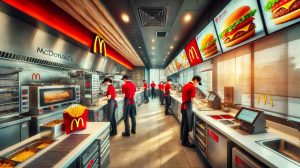
Investing in a resale franchise can be a great way to fast-track your entry into the McDonald’s system. These opportunities typically involve purchasing an existing restaurant from a current franchisee.
Benefits of Resale Opportunities
- Established Customer Base: Unlike a new franchise, a resale restaurant already has a loyal customer base and a proven location.
- Immediate Cash Flow: Existing franchises often generate revenue from day one, reducing the uncertainty of building a business from scratch.
- Trained Staff and Operational Systems: Many resale franchises come with an existing team of trained employees and operational systems in place.
Higher Initial Costs
The downside to resale opportunities is the higher upfront cost. Resale franchises are valued based on:
- Historical profitability.
- Future cash flow projections.
- Location and market conditions.
For example, in 2023, the cost of purchasing a resale franchise, including rights and equipment, ranged between £500,000 and £1.85 million. These valuations reflect the franchise’s established value in the market.
Key Considerations Before Buying
Before purchasing a resale franchise, potential buyers should:
- Conduct Thorough Due Diligence: Review financial statements, customer traffic data, and operational efficiency.
- Assess Market Trends: Ensure the location has growth potential and isn’t oversaturated with competitors.
- Negotiate Terms: Work closely with McDonald’s representatives and the seller to understand transfer fees and any ongoing commitments.
Resale opportunities can be a lucrative investment, but they require careful analysis to ensure the purchase aligns with your long-term financial and operational goals.
What Commitment Is Required to Be a Successful Franchise Owner?
Owning a McDonald’s franchise is not a passive investment. Franchisees must dedicate time and effort to ensure their restaurant operates efficiently. Responsibilities include:
- Overseeing daily operations, such as staffing and supply chain management.
- Ensuring compliance with McDonald’s quality and service standards.
- Engaging in local marketing and community outreach.
Franchisees can expect an annual cash flow of £120,000 to £400,000 after the first year. Cash flow is defined as the money remaining in the business before personal withdrawals, taxes, or loan repayments.
What Are the Common Challenges Faced by McDonald’s Franchisees?

Running a McDonald’s franchise is a rewarding experience, but it also comes with its fair share of challenges. Knowing these challenges in advance can help franchisees develop strategies to overcome them effectively.
Managing Operational Costs
Operational expenses such as rent, royalties, staff wages, and utilities can quickly add up. Balancing these costs while maintaining profitability is a key challenge for many franchisees.
- Rent: For 80% of franchised restaurants, rent accounts for 8% to 18% of net sales. It’s calculated based on projected sales over a 10-year period and is typically fixed for the initial 20-year term.
- Royalties and Marketing Fees: These fixed percentages can take a significant portion of revenue, making it essential to manage other expenses efficiently.
Staff Retention and Recruitment
The fast-food industry is notorious for high employee turnover rates.
- Retention Issues: Many employees view fast-food jobs as temporary, leading to frequent hiring and training cycles.
- Labour Market Challenges: Finding skilled and reliable staff can be difficult, especially in competitive urban markets.
- Solutions: Offering incentives such as flexible schedules, training opportunities, and clear career progression paths can help retain top talent.
Competition in the Fast-Food Industry
Despite McDonald’s strong brand presence, franchisees face competition from other fast-food giants, including KFC, Burger King, and local businesses.
- Price Wars: Competing on price can strain profit margins.
- Customer Expectations: Meeting customer demands for speed, quality, and convenience requires constant vigilance.
Maintaining Quality and Consistency
McDonald’s strict quality standards ensure uniformity across all locations. However, adhering to these standards can be challenging, especially during peak hours or in high-volume stores.
- Health and Safety Regulations: Compliance with food safety regulations requires ongoing training and monitoring.
- Supply Chain Issues: Delays or disruptions in the supply chain can impact service and customer satisfaction.
Adapting to Changing Consumer Preferences
The fast-food industry is constantly evolving, with trends like plant-based menus, eco-friendly packaging, and digital ordering systems becoming increasingly important. Franchisees must be proactive in adapting to these trends while balancing costs.
Balancing Work and Personal Life
Running a McDonald’s franchise demands hands-on involvement, especially during the initial years. Franchisees often find themselves working long hours to oversee operations, which can affect their work-life balance.
Strategies for Success
- Effective Delegation: Building a strong management team can alleviate some of the operational burdens.
- Continuous Training: Regular staff training ensures consistency and quality in service.
- Financial Monitoring: Using tools to track expenses and profitability helps in making informed business decisions.
While these challenges can be daunting, they are manageable with the right strategies and support systems in place. Franchisees who remain committed to excellence often find that the rewards outweigh the challenges.
What Is the Return on Investment for a McDonald’s Franchise?
One of the key attractions of owning a McDonald’s franchise is its return on investment (ROI). Over a 20-year term, franchisees can expect an ROI of 20% to 25% annually.
This calculation excludes additional investments made during the term, such as renovations or new equipment purchases. Franchisees who operate efficiently and maximise sales potential often see higher returns.
How Do You Apply for a McDonald’s Franchise in the UK?
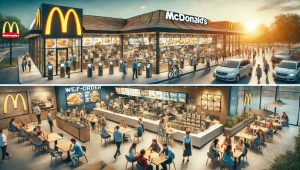
Applying for a McDonald’s franchise in the UK is a structured process that ensures the company selects candidates who are not only financially capable but also committed to upholding the brand’s values and operational standards.
The entire selection process typically takes four to six months, during which candidates undergo multiple assessments and training sessions. Here’s a step-by-step guide to the application process:
1. Making an Application
Your journey begins by attending a Franchising Event, where you’ll gain insights into McDonald’s franchising opportunities and expectations. After the event, you’ll need to complete an application form to officially register your interest in becoming a franchisee.
This application is your chance to highlight your qualifications, financial readiness, and motivation for joining the McDonald’s system.
2. First Meeting
Once your application is reviewed and shortlisted, McDonald’s will invite you to a First Meeting. This is an opportunity for both parties to get to know each other better. During the discussion, you’ll explain why you believe you’re a great fit for McDonald’s, sharing your vision and alignment with the brand’s values.
3. Restaurant Experience
Candidates who progress past the first meeting are invited to spend five days in a McDonald’s restaurant with an established team. This hands-on experience allows you to:
- Observe day-to-day operations.
- Understand the challenges and opportunities of running a restaurant.
- Reflect on how you would manage your own McDonald’s franchise.
This stage is critical for candidates to assess their interest and compatibility with McDonald’s fast-paced environment.
4. Second Meeting
After the restaurant experience, you’ll meet with McDonald’s regional Vice President and Head of Franchising. This meeting explores your suitability as a franchisee in greater detail, with a focus on the insights you gained during your restaurant experience.
5. Psychometric Assessment
If you pass the second meeting, you’ll be required to complete a psychometric assessment. This evaluation measures your personality, decision-making style, and leadership potential, ensuring you align with McDonald’s requirements for successful franchise ownership.
6. Panel Meeting
Candidates who perform well in the psychometric assessment are invited to a Panel Meeting with three senior Vice Presidents. This is the final stage of the selection process, where your overall suitability and readiness to join the McDonald’s family are evaluated.
7. Training
Once you pass the panel meeting, you’ll begin comprehensive training to prepare you for franchise ownership. This training covers all aspects of McDonald’s operations, including:
- Managing staff and daily operations.
- Understanding financial metrics and profitability.
- Maintaining food quality and service standards.
8. Restaurant Offer
During the training phase, successful candidates receive an offer to purchase the rights to a McDonald’s restaurant. This offer includes details about the restaurant’s location, expected investment, and operational requirements.
9. Handover
Once you successfully complete your training and finalise the purchase agreement, the handover process begins. At this stage:
- You’ll sign a franchise agreement that outlines your rights and responsibilities as a franchisee.
- The keys to the restaurant will be handed over to you.
- You’ll receive ongoing support from an experienced Franchisee Consultant, ensuring a smooth transition into ownership.
Next Steps
With the restaurant officially under your management, you’ll start implementing what you’ve learned during training. McDonald’s continues to provide guidance and resources to help you succeed in this exciting new venture.
Conclusion
Owning a McDonald’s franchise in the UK is a substantial investment with the potential for significant returns. With a clear understanding of the costs, ongoing commitments, and the support provided by McDonald’s, aspiring franchisees can position themselves for success.
By leveraging the brand’s global reputation and proven business model, franchisees can build a profitable and rewarding venture.
FAQs
What is the minimum investment to open a McDonald’s franchise in the UK?
You must have at least 25% of the total investment in unencumbered funds, typically starting at £150,000.
How are McDonald’s franchise royalties calculated?
Franchisees pay 5% of net sales as royalties, plus 4.3% for marketing contributions.
Can I own multiple McDonald’s franchises in the UK?
Yes, experienced franchisees are often encouraged to expand their portfolios.
How long does it take to break even on a McDonald’s franchise?
The break-even timeline depends on factors like location and sales but usually occurs within a few years.
Does McDonald’s provide training for franchisees?
Yes, McDonald’s offers extensive training to prepare franchisees for every aspect of restaurant operations.
What are the risks of owning a McDonald’s franchise?
Risks include high operational costs, competition, and economic challenges.
Can I sell my McDonald’s franchise in the future?
Yes, you can sell your franchise, with the valuation based on profitability and market conditions.

